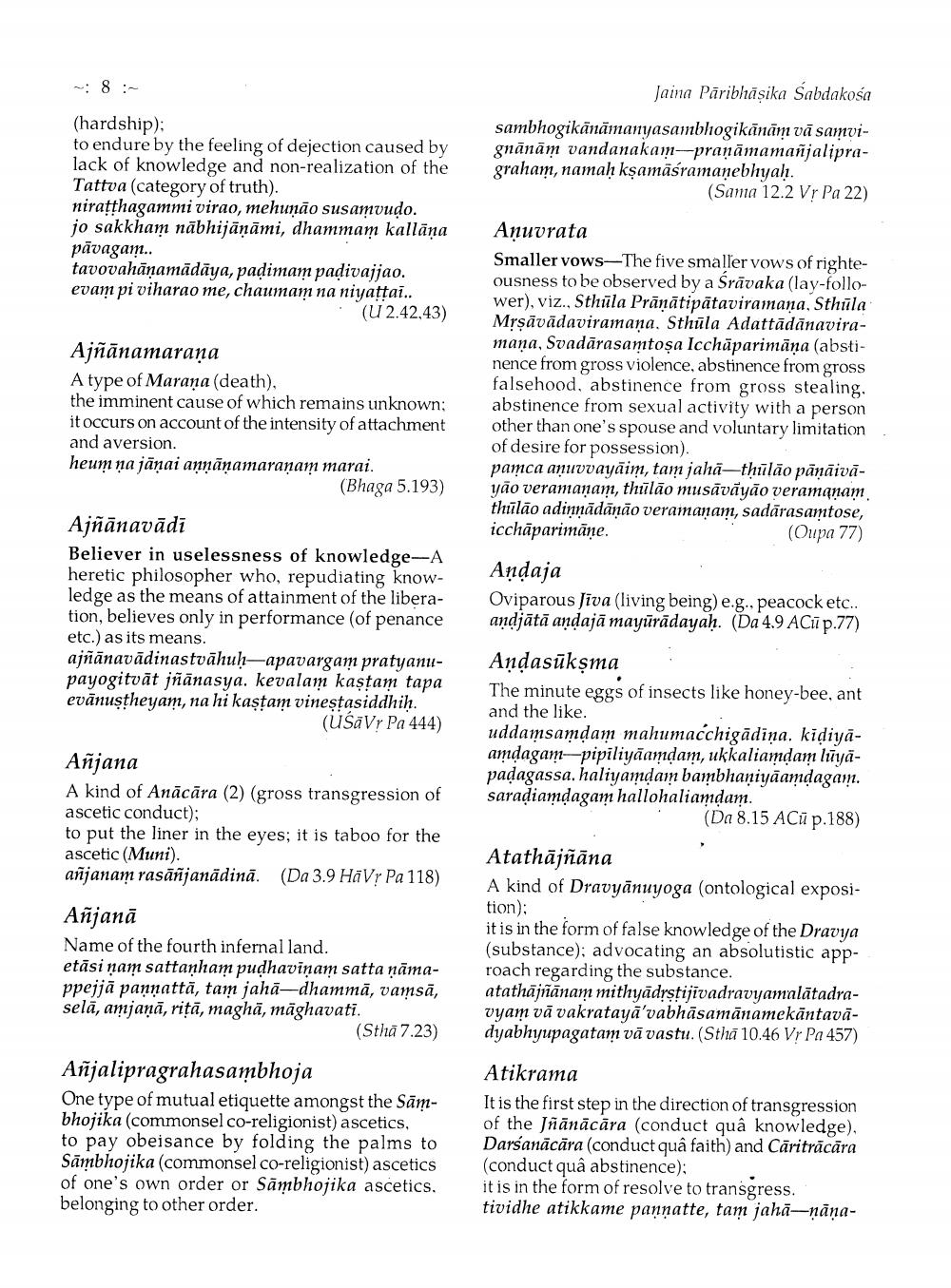________________
8
:
Jaina Pāribhāșika Sabdakosa sambhogikānāmanyasambhogikānām vā samvignānām vandanakam-pranāmamañjalipragraham, namaḥ kṣamāśramanebhyah.
(Sama 12.2 Vr Pa 22)
(hardship); to endure by the feeling of dejection caused by lack of knowledge and non-realization of the Tattva (category of truth). niratthagammi virao, mehunão susamvudo. jo sakkham nābhijāņāmi, dhammam kalläna pāvagam.. tavovahāņamādāya, padimam padivajjao. evam pi viharao me,chaumam na niyattai..
(U 2.42,43)
Ajñānamaraņa A type of Maraña (death), the imminent cause of which remains unknown: it occurs on account of the intensity of attachment and aversion. heum na jāņai anņāṇamaranam marai.
(Bhaga 5.193) Ajñānavādi Believer in uselessness of knowledge--A heretic philosopher who, repudiating knowledge as the means of attainment of the liberation, believes only in performance (of penance etc.) as its means. ajñānavādinastvähuh-apavargam pratyanupayogitvāt jñānasya. kevalam kastam tapa evānuştheyam, na hi kastam vineștasiddhiḥ.
(ušāV? Pa 444)
Anuvrata Smaller vows-The five smaller vows of righteousness to be observed by a Srāvaka (lay-follower), viz., Sthūla Prāņātipātaviramana, Sthūla Mrşävädaviramana. Sthūla Adattādānaviramana, Svadārasamtosa Icchäparimāna (abstinence from gross violence, abstinence from gross falsehood, abstinence from gross stealing. abstinence from sexual activity with a person other than one's spouse and voluntary limitation of desire for possession). pamca aņuvvayāim, tam jahā-thūlāo pāņāivāyão veramanam, thūlāo musāvāyāo veramanam thiūlāo adinnādāņāo veramanam, sadārasamtose, icchāparimāne.
(Oupa 77)
Andaja Oviparous Jiva (living being) e.g. peacock etc.. andjātā andajā mayūrādayah. (Da 4.9 ACüp.77)
Andasūkşma The minute eggs of insects like honey-bee, ant and the like. uddamsamdam mahumacchigādiņa, kidiyaamdagam--pipiliyžamdam, ukkaliamdam luyapadagassa, haliyamdam bambhaạiyāamdagam. saradiamdagam hallohaliamdam.
(Da 8.15 ACū p.188)
Añjana A kind of Anācāra (2) (gross transgression of ascetic conduct); to put the liner in the eyes; it is taboo for the ascetic (Muni). añjanam rasāñjanädinā. (Da 3.9 HäVr Pa 118)
Añjanā Name of the fourth infernal land. etāsi nam sattanham pudhaviņam satta ņāmappejjā pannattā, tam jahā-dhammā, vamsā, selā, amjaņā, ritā, maghā, māghavati.
(Sthā 7.23)
Atathājñāna A kind of Dravyānuyoga (ontological exposition); it is in the form of false knowledge of the Dravya (substance); advocating an absolutistic approach regarding the substance. atathājñānam mithyādrstijivadravyamalātadravyam vā vakratayā'vabhāsamānamekantavādyabhyupagatam vā vastu. (Stha 10.46 Vr Pa 457)
Añjalipragrahasambhoja One type of mutual etiquette amongst the Sāmbhojika (commonsel co-religionist) ascetics, to pay obeisance by folding the palms to Sambhojika (commonsel co-religionist) ascetics of one's own order or Sāmbhojika ascetics. belonging to other order.
Atikrama It is the first step in the direction of transgression of the Jñānācāra (conduct quâ knowledge), Darsanācāra (conduct quâ faith) and Caritrācāra (conduct quâ abstinence); it is in the form of resolve to transgress. tividhe atikkame pannatte, tam jahā—ņāņa




